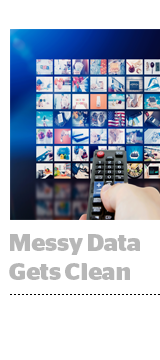
Video ad startup VideoAmp said Wednesday it has acquired Boston-based data processor IronGrid and partnered with Vizio’s TV data-selling unit, Inscape.
VideoAmp hopes to use IronGrid’s data processing powers and its Inscape partnership to strengthen its privacy-compliant household ID based on TV data.
Terms of the IronGrid sale were not disclosed, though the company is small, with only 11 employees. VideoAmp will retire IronGrid’s name.
VideoAmp, which is building planning and measurement software for TV ad buyers and sellers, will use IronGrid’s expertise to process the unstructured data that comes from set-top boxes.
“The data that comes out of a set-top box is quite messy,” VideoAmp Chief Strategy Officer Jay Prasad told AdExchanger.
Consumer behaviors like pausing TV, tuning into a channel for only a few seconds or leaving a TV on for several hours (aka “zombie viewing”) all contribute to messy data sets. IronGrid’s technology allows it to discern what actually counts as viewership so it can provide anonymized household-level viewership data to advertisers.
“We know how to take all this raw and ugly data, cleanse it, validate it and make it usable for advertising applications,” VideoAmp’s VP of data, Randy Laughlin, told AdExchanger.
IronGrid’s video processing will help VideoAmp improve its household ID. The ID is powered by Inscape, which uses automatic content recognition (ACR) technology built into Vizio smart TVs to gather information on viewing habits.
IronGrid processes set-top box data for four different multichannel video programming distributors (MVPDs).
“Assuming we onboard those operators into a VideoAmp household ID, we will have an anonymized comingled viewership data set,” Prasad said.
“The structure of our whole data strategy is to make a TV-based household ID,” he explained. “We’ve partnered to make Vizio TVs an anchor of a VideoAmp household ID.”
Mining through loads of data with the help of IronGrid and Inscape should give VideoAmp another step toward achieving that vision.
IronGrid has worked in data processing for over a decade. It was once part of a startup company that was eventually sold to Microsoft. In 2012, it launched as an independent company.
This post was syndicated from Ad Exchanger.


More Stories
Daily Wire Welcomes Perplexity to Advertise on The Ben Shapiro Show
Here’s the Roundup for the Week Ending March 7
Aflac’s Dan Amos Reveals How He’s Successfully Held Onto the CEO’s Job for 35 Years